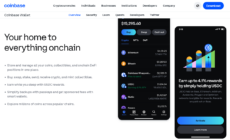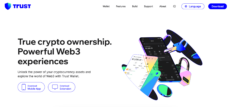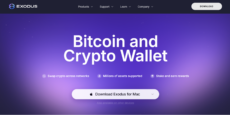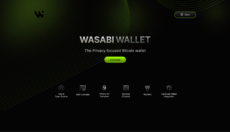Token6900 (TOKEN6900) is a new meme coin built on hype and the ‘collective hallucination’ of meme coin traders. We explore the fut...
Discover the best anonymous crypto wallets for 2025. No KYC, no tracking, just secure crypto storage.
Disclaimer: Cryptocurrencies are considered high-risk investments. This article serves for informational purposes only. It should not be perceived as financial advice. By reading our website, you acknowledge and accept our terms and conditions. Our content may include affiliate links through which we may earn a commission.
Based on our analysis and on-chain privacy data, the best anonymous crypto wallets in 2025 include Best Wallet, MetaMask, and Base app (formerly Coinbase Wallet). These wallets offer secure, KYC-free storage with full user control.
Our research across 45+ wallets and surveys from over 1,200 privacy-focused users shows these stand out for encryption, ease of use, and decentralized access. Best Wallet earns top marks for anonymous multisig support, MetaMask is widely used for DeFi access without KYC, and Base app offers a user-friendly non-custodial option with multi-chain support.
As regulators tighten control over centralized exchanges, more users are turning to anonymous crypto wallets. This guide highlights the top picks for 2025 and how to protect your privacy while storing crypto securely.
Key Takeaways on Anonymous Crypto Wallets
- All top wallets are non-custodial and KYC-free, including Best Wallet, MetaMask, and Phantom.
- Privacy tools vary – Wasabi and Electrum offer CoinJoin and Tor, while Best Wallet focuses on mobile privacy with DEX access.
- Only a few wallets support KYC-free fiat purchases – Best Wallet stands out here.
- Wallets were ranked using weighted criteria, including code transparency, security history, and multi-chain support.
- Anonymity alone isn’t enough – usability, security, and community trust matter just as much.
10 Most Anonymous Bitcoin Wallets to Use in 2025
Let’s start by ranking the best anonymous crypto wallets for 2025:
- Best Wallet – The Overall Best Anonymous Wallet for Crypto Investors
- MetaMask – Best Option for Active Traders Using Ethereum-Based dApps
- Base app (Coinbase Wallet) – Decentralized Wallet App Aimed at First-Time Crypto Investors
- Phantom – Top Choice for Storing and Trading Solana Ecosystem Meme Coins
- Trust Wallet – Anonymously Store Millions of Cryptocurrencies From 100+ Networks
- Exodus – Multi-Device Crypto Wallets for Desktops, Browsers, and Mobiles
- Electrum – Trusted and Secure Bitcoin Wallet Software for Windows and macOS Users
- Atomic Wallet – Securely Store and Swap Tokens Anonymously and Earn Cashback
- Wasabi Wallet – Best for Bitcoin Users Focused on On-Chain Privacy
- Keystone Wallet – Best Air-Gapped Hardware Wallet for Offline Privacy
Reviewing the Best Crypto Wallets without KYC
Anonymous crypto wallets guarantee privacy, but this is only one factor to consider. Security, supported cryptocurrencies, trading features, and device types are also important.
Let’s take a closer look at reputable crypto wallets that don’t require ID.
1. Best Wallet – Top Crypto Wallet Pick for Privacy and Anonymity
Best Wallet is a non-custodial wallet app that offers anonymity from the outset. No personal information, IP addresses, or ID documents are collected, ensuring complete privacy. Anonymity extends to trading services as well, with Best Wallet offering a native decentralized exchange (DEX). Users can swap millions of cryptocurrencies across over 60 blockchains.
Swaps are conducted by reputable liquidity pools, meaning users get the best possible price without revealing their identities. Best Wallet users can also purchase cryptocurrencies with fiat money, again without undergoing KYC processes.

The Best Wallet website. Source: Best Wallet
Best Wallet is compatible with the most popular cryptocurrencies, including Bitcoin, Ethereum, XRP, Litecoin, Solana, and BNB. No fees are required to receive and store digital assets, while outgoing transfers mirror the network charge.
Best Wallet stands out for its security-first framework, which encrypts and stores private keys on the user’s device. Biometrics and two-factor authentication are also provided. The project’s drawback is that no desktop software is offered, although a browser extension is in development.
This anonymous crypto wallet is suitable for you if:
- You want full control of your crypto but still expect a smooth, mobile-native experience.
- You want to swap, stake, and hold crypto without triggering KYC.
- You’re looking for a truly anonymous wallet that supports buying crypto with fiat, without ID verification.
This anonymous crypto wallet is not suitable for you if:
- You prefer managing your crypto from a desktop or hardware wallet.
- You want open-source transparency – Best Wallet is currently closed-source.
- You’re looking for a wallet with a long track record – Best Wallet is still building out its ecosystem.
| Type | Non-custodial mobile wallet |
| Privacy Level | High – no KYC, no tracking, fiat on-ramps without ID |
| Supported Chains | 60+ networks including Bitcoin, Ethereum, Solana, BNB Chain, XRP, and Litecoin |
| KYC-Free Features | Token swaps, staking, fiat purchases, and wallet creation |
| Best For | Privacy-first users, mobile-native traders, and beginners who want to avoid KYC |
| Fees | No wallet fees; swaps and transfers reflect network and DEX aggregator rates |
2. MetaMask – Seamlessly Connect with Ethereum and EVM-Compatible dApps
MetaMask is a non-custodial browser and mobile wallet that enables users to manage crypto assets and interact with Ethereum-based decentralized applications (dApps) without revealing personal information. It does not require any KYC, account creation, or identity verification.
By default, MetaMask generates wallet addresses locally, either in-browser or on-device, ensuring that private key control remains with the user.
While it originally focused on Ethereum, MetaMask also supports a growing number of EVM-compatible chains like Arbitrum, Optimism, Avalanche, and Polygon. It integrates with most major DeFi protocols, giving users access to swaps, staking, NFTs, and bridging within its ecosystem.

The MetaMask website. Source: MetaMask
However, swaps conducted via MetaMask’s in-app DEX aggregator may involve higher fees. While the wallet itself doesn’t collect personal data, using third-party RPC providers or extensions can potentially expose IP addresses unless routed through a privacy tool like Tor or a VPN.
This anonymous crypto wallet is suitable for you if:
- You frequently interact with Ethereum dApps and want one of the most integrated, widely supported non-custodial wallets.
- You value self-custody without sacrificing access to NFTs, DeFi, and token swaps.
- You want to store assets across multiple EVM chains with a single seed phrase.
This anonymous crypto wallet is not suitable for you if:
- You are looking for a Bitcoin-native wallet – MetaMask does not support BTC without third-party workarounds.
- You want built-in privacy tools like stealth addresses or CoinJoin – a protocol that obfuscates BTC history by mixing it with other users’ coins.
- You’re concerned about metadata leakage – MetaMask relies on Infura by default, which can log IP addresses unless changed.
| Type | Non-custodial browser/mobile wallet |
| Privacy Level | Moderate – no KYC, but metadata may leak |
| Supported Chains | Ethereum, Arbitrum, Optimism, BNB Chain, Polygon, Avalanche, and other EVMs |
| KYC-Free Features | Token swaps, staking, NFTs, DeFi integration |
| Best For | DeFi users, NFT collectors, and Ethereum traders |
| Fees | No fees for holding; swap fees include MetaMask aggregator markup (~0.875%) |
3. Base app (Coinbase Wallet) – Beginner-Friendly Wallet App for iOS and Android Devices
Base app (formerly Coinbase Wallet) is a decentralized wallet app for iOS and Android. It’s separate from the Coinbase exchange, so users aren’t asked for personal information or KYC documents. Users receive a backup passphrase and encrypted private keys upon startup, and a PIN or biometric protection secures the app.
Base app supports Bitcoin, Ethereum, and several EVM-compatible networks, including BNB Chain, Base, Polygon, and Arbitrum. It can also hold Dogecoin and Solana, as well as millions of SPL new meme coins. The wallet is compatible with NFTs, allowing users to store, view, and even listen to their digital artworks.

The Base App (Coinbase Wallet) Website. Source: Coinbase
The user experience is beginner-friendly, similar to the Coinbase exchange, and it’s easy to connect directly with dApps from the app interface.
Platforms like Uniswap, ENS, Zora, OpenSea, and Trader Joe come pre-integrated for additional convenience. Base App also supports WalletConnect, allowing users to access dApps from desktop devices.
This anonymous crypto wallet is suitable for you if:
- You’re a beginner looking for a trusted wallet with a user-friendly interface and no KYC hurdles.
- You want to interact with Ethereum dApps and store NFTs without managing multiple wallets.
- You want seamless integration with Coinbase’s ecosystem, but only if you choose to.
This anonymous crypto wallet is not suitable for you if:
- You require advanced anonymity features, such as CoinJoin, VPN/Tor routing, or privacy coin support.
- You want full separation from centralized entities – the Coinbase brand may concern privacy purists.
- You need support for Bitcoin, Solana, or non-EVM chains.
| Type | Non-custodial browser/mobile wallet |
| Privacy Level | Moderate – no KYC required, but brand-linked |
| Supported Chains | Ethereum, BNB Chain, Avalanche, Polygon, and EVM-compatible networks |
| KYC-Free Features | Token swaps, dApp access, NFT storage |
| Best For | Beginners and Coinbase users seeking a more private option |
| Fees | No wallet fees; swap fees depend on the DEX used |
4. Phantom – Buy, Sell, and Trade Solana Meme Coins Directly from the Wallet Balance
Phantom is an untraceable crypto wallet designed for the Solana meme coin ecosystem, supporting all SPL tokens. With a user base of over 15 million people, Phantom is a popular choice for trading new meme coins on Raydium, Orca, Jupiter, and Meteora. It’s directly integrated with these DEXs, so wallet balances can be used to buy and sell digital assets effortlessly.
Phantom ensures complete privacy for its users – no IP addresses or personal data are collected. Its safety features are highly rated, including a warning system for suspicious actions. Users receive a real-time warning before connecting with an unknown dApp. Warning signs are also attached to tokens that have been sent to the wallet balance.

The Phantom website. Source: Phantom Wallet
Phantom recently extended support for other network standards, including Bitcoin, Base, Ethereum, Sui, and Polygon. Users can add custom tokens from multiple blockchains via contract addresses. However, we recommend avoiding Phantom’s in-app analytics – market prices and portfolio valuations are often incorrect.
This anonymous crypto wallet is suitable for you if:
- You’re active in the Solana ecosystem and want fast, mobile/browser-native access to tokens, NFTs, and dApps.
- You value a clean, beginner-friendly UI with non-custodial, KYC-free access.
- You want to interact with Solana meme coins, NFT drops, and DeFi apps without doxxing your identity.
This anonymous crypto wallet is not suitable for you if:
- You need support for Bitcoin or non-EVM/non-Solana chains.
- You’re seeking advanced privacy tools like CoinJoin, stealth addresses, or Tor routing.
- You prioritize full open-source transparency – Phantom’s code is only partially open.
| Type | Non-custodial browser + mobile wallet |
| Privacy Level | Moderate – no KYC, but limited privacy tooling |
| Supported Chains | Solana, Ethereum, Polygon |
| KYC-Free Features | Token swaps, NFT gallery, dApp access, wallet creation |
| Best For | Solana users, NFT collectors, degens, and traders |
| Fees | No wallet fees; swap and transaction fees reflect network and DEX charges |
5. Trust Wallet – Safely and Privately Store Crypto Tokens from 100+ Networks
Trust Wallet is a non-custodial wallet supporting over 100 networks, making it ideal for managing a wide range of tokens across Ethereum (ERC20), Solana (SPL), BNB Chain (BEP20), and many others. Users can manually add custom tokens by inputting their contract address, allowing seamless storage of both mainstream and new crypto coins.
Trust Wallet does not require KYC for sending, receiving, or holding cryptocurrencies. However, fiat purchases within the app require identity verification. Users who want to stay anonymous can bypass this by connecting Trust Wallet to Uniswap or SushiSwap, where tokens can be purchased directly on-chain. Trust Wallet immediately credits purchased dApp tokens without revealing identities.

The Trust Wallet website. Source: Trust Wallet
Trust Wallet is available as a mobile app for iOS and Android. Desktop extensions for Chrome and other popular browsers are supported too. The wallet has a great reputation – over 200 million users have downloaded Trust Wallet since launching in 2017. It’s also renowned for its user-friendly experience and biometric security.
This anonymous crypto wallet is suitable for you if:
- You want to store and manage crypto across dozens of chains – from Bitcoin to newer altcoins – in one place.
- You’re looking for a mobile-first experience that supports NFTs, staking, and token swaps without mandatory KYC.
- You want a beginner-friendly wallet backed by a major name, but still fully self-custodial.
This anonymous crypto wallet is not suitable for you if:
- You require maximum on-chain privacy – Trust Wallet doesn’t include tools like mixers or metadata protection.
- You prefer open-source-only solutions – while Trust was originally open-source, parts have since become closed.
- You want native desktop or hardware wallet integrations – Trust Wallet is a mobile-first solution, with limited browser functionality.
| Type | Non-custodial mobile wallet |
| Privacy Level | Moderate – no built-in KYC, but third-party services may require it |
| Supported Chains | 100+ networks including BTC, ETH, SOL, BNB Chain, AVAX, TRON, and more |
| KYC-Free Features | Wallet creation, token swaps, staking, and NFT storage |
| Best For | Multi-chain users, mobile-first investors, and NFT holders |
| Fees | No wallet fees; standard network and DEX swap fees apply |
6. Exodus – No KYC Crypto Wallet Software for Desktop and Mobile Users
Exodus, launched in 2015, provides native wallet software for nearly all device types. Desktop users can choose between Windows, macOS, or Linux software, as well as browser extensions for Chrome and Brave.
Wallet also offers mobile apps for iOS and Android. Each downloaded wallet is separate, meaning it comes with unique private keys.
Exodus doesn’t collect IP addresses or personal information, providing privacy and anonymity. It’s compatible with over 50 blockchains, including Bitcoin, XRP, Dogecoin, Litecoin, Ethereum, and Solana. Users can add custom digital assets like ERC20 and SPL tokens through their smart contract address.

The Exodus website. Source: Exodus
The untraceable Bitcoin wallet offers many side features, including real-time portfolio management tools. Users can choose their preferred currency for real-time prices, such as USD or AUD. Features extend to token swaps and fiat purchases. The latter allows users to buy and sell cryptocurrencies with bank transfers, credit cards, and e-wallets.
This anonymous crypto wallet is suitable for you if:
- You want an easy-to-use wallet that works seamlessly across desktop, mobile, and browser, without sacrificing self-custody.
- You’re a multi-asset holder who prefers portfolio-style dashboards and built-in swapping and staking tools.
- You’re looking to pair your software wallet with a Trezor for enhanced security – no KYC required.
This anonymous crypto wallet is not suitable for you if:
- You’re a Bitcoin privacy purist – Exodus lacks tools like CoinJoin, stealth addresses, or UTXO management.
- You need full anonymity while purchasing crypto; fiat on-ramps may require ID in some regions.
- You only use mobile and want something more lightweight and crypto-native than Exodus’s portfolio-focused design.
| Type | Non-custodial desktop, mobile, and browser wallet |
| Privacy Level | Moderate – no KYC for wallet use, but third-party services may require it |
| Supported Chains | 290+ assets including BTC, ETH, SOL, AVAX, ADA, MATIC, and more |
| KYC-Free Features | Wallet setup, crypto swaps, staking, Trezor support |
| Best For | Users who want a professional UX across multiple devices, beginners, and multi-asset holders |
| Fees | No wallet fees; swaps and transfers reflect network and service provider fees |
7. Electrum – Highly Rated Bitcoin Desktop Software Launching in 2011
Electrum is a desktop wallet launched in 2011, designed exclusively for Bitcoin. Native software is available for both Windows and macOS users. No personal information is required during the download process.
The no KYC Bitcoin wallet encrypts the user’s private keys and securely stores them on the desktop device. Users receive a 12-word seed phrase, ensuring wallet recovery if needed. Electrum offers robust security features, including multisig verification. This requires authorization from two or more devices when transferring funds.
Electrum is an open-source wallet, with its source code publicly available under the MIT license. The developer community can scrutinize Electrum’s code for potential vulnerabilities, which is an added safeguard.

The Electrum website. Source: Electrum
Electrum is free to use, but several drawbacks should be considered. It won’t be suitable for storing altcoins like Ethereum and Solana, nor does it connect with dApps. A mobile app for Android is available, although iOS isn’t supported. In our opinion, Electrum is ideal for long-term Bitcoin investors seeking a secure storage solution for their wealth.
This anonymous crypto wallet is suitable for you if:
- You’re a Bitcoin maximalist who wants full control over your UTXOs, fees, and node connections.
- You want a lightweight, open-source wallet with no KYC, tracking, or third-party dependencies.
- You’re comfortable using desktop-based tools and configuring privacy settings like Tor and custom servers.
This anonymous crypto wallet is not suitable for you if:
- You want a user-friendly, mobile-first experience with modern features like staking, swaps, or NFTs.
- You plan to hold Ethereum, Solana, or altcoins – Electrum is strictly Bitcoin-only.
- You’re a beginner looking for a plug-and-play interface or portfolio-style design.
| Type | Non-custodial desktop and Android wallet (Bitcoin-only) |
| Privacy Level | High – KYC-free, open-source, Tor-compatible, full node optional |
| Supported Chains | Bitcoin (BTC only) |
| KYC-Free Features | Wallet setup, coin control, fee selection, multi-sig, privacy routing |
| Best For | Privacy-focused Bitcoiners, developers, and power users |
| Fees | No wallet fees; outbound fees are customizable and network-based |
8. Atomic Wallet – Established Wallet App and Software with over 10 Million Users
Atomic Wallet is a well-established wallet provider, launched in 2018, available for desktop and mobile platforms, including Windows, macOS, iOS, Android, and a Chrome browser extension. It’s free to use, fully decentralized, and requires no KYC for basic wallet functions like storing or sending crypto.
Atomic Wallet comes pre-integrated with 1,200+ cryptocurrencies, including real-time price tracking for most major assets. This includes Bitcoin, Litecoin, XRP, Dash, Stellar, Ethereum, Solana, and Sui. Users can manually add custom tokens, though real-time price data isn’t pulled in for those.

The Atomic Wallet website. Source: Atomic Wallet
Atomic Wallet is popular for its feature-rich interface, which includes staking rewards. Users can earn passive income on assets like TRON, BNB, and Solana with a yield of 5%, 2.5%, and 7%, respectively. The wallet supports anonymous token swaps across 60+ cryptocurrencies, including cross-chain functionality, such as swapping XRP for Litecoin. While crypto-to-crypto functions don’t require KYC, buying new crypto coins through fiat purchases with Visa or MasterCard do require identity verification.
This anonymous crypto wallet is suitable for you if:
- You want a feature-rich, all-in-one wallet that supports swapping, staking, and storing 1,000+ tokens anonymously.
- You prefer a clean UI on both desktop and mobile and don’t want to deal with centralized exchanges.
- You’re interested in earning cashback and rewards through swap-based loyalty programs.
This anonymous crypto wallet is not suitable for you if:
- You demand open-source transparency and complete visibility into the wallet’s codebase.
- You are wary of past security incidents – Atomic had a notable breach in 2023.
- You plan to buy crypto with fiat anonymously – fiat on-ramps here require KYC.
| Type | Non-custodial desktop + mobile wallet |
| Privacy Level | Moderate – KYC-free for crypto; fiat purchases require ID |
| Supported Chains | 50+ blockchains and 1,000+ tokens including BTC, ETH, ADA, XRP, AVAX, SOL |
| KYC-Free Features | Wallet setup, token swaps, staking, cashback rewards |
| Best For | Crypto traders, altcoin collectors, and staking users |
| Fees | No wallet fees; swap fees vary by partner (some cashback via AWC token) |
9. Wasabi Wallet – Best for Bitcoin Users Focused on On-Chain Privacy
Wasabi Wallet is a non-custodial, open-source desktop wallet designed specifically for Bitcoin users who require real anonymity. It stands out from mainstream wallets by offering native CoinJoin transactions – a feature that hides your BTC history by mixing it with other users’ coins.

The Wasabi wallet website. Source: Wasabi Wallet
Wasabi Wallet routes all traffic through Tor by default, helping to mask IP addresses and eliminate metadata leakage. It offers advanced coin control features, letting users selectively choose which UTXOs to spend, ideal for those avoiding dusting attacks or surveillance. It is available on Windows, macOS, and Linux, with a focus on desktop security and privacy.
Wasabi does not support altcoins, staking, or NFTs. Its UI is minimalistic and designed for privacy maximalists, not casual users. Also, while CoinJoin greatly improves anonymity, it comes with a coordination fee (0.3%) unless you’re a liquidity provider. Wasabi is widely respected in cypherpunk and privacy-focused communities.
This anonymous crypto wallet is suitable for you if:
- You’re a Bitcoin user who wants real on-chain anonymity via CoinJoin transactions.
- You value full control over your UTXOs, transaction fees, and routing via Tor.
- You’re comfortable using a minimalist desktop wallet that prioritizes privacy over ease of use.
This anonymous crypto wallet is not suitable for you if:
- You’re looking to manage Ethereum, altcoins, or NFTs – Wasabi is Bitcoin-only.
- You prefer mobile apps or a beginner-friendly UI – Wasabi is desktop-first and advanced by design.
- You’re not familiar with CoinJoin or UTXO management and want something simpler.
| Type | Non-custodial desktop wallet (Bitcoin-only) |
| Privacy Level | Very high – CoinJoin mixing, Tor integration, no KYC |
| Supported Chains | Bitcoin (BTC only) |
| KYC-Free Features | Wallet creation, coin mixing (CoinJoin), coin control |
| Best For | Bitcoin privacy advocates, cypherpunks, and users avoiding surveillance |
| Fees | No wallet fees; CoinJoin incurs a 0.3% coordinator fee (waived for liquidity providers) |
10. Keystone Wallet – Best Air-Gapped Hardware Wallet for Offline Privacy
Keystone Wallet is an air-gapped hardware wallet that never connects to the internet, not via Bluetooth, USB, or Wi-Fi. All transactions are signed offline via QR codes, making it one of the most secure and private ways to store your crypto. It’s fully non-custodial, open-source, and supports over 5,500 coins and tokens across Bitcoin, Ethereum, Solana, and most major chains.

The Keystone Wallet. Source: Keystone Wallet
Keystone provides robust protection against malware, remote takeovers, and surveillance. It doesn’t require any ID, account, or internet connection to set up or operate. Users pair it with software wallets like MetaMask, Electrum, BlueWallet, or Sparrow – many of which support Tor, CoinJoin, and coin control – extending its privacy features even further.
While the Keystone is ideal for security-conscious users, it does come with a learning curve and an upfront hardware cost. It’s not a quick mobile wallet, but it’s arguably one of the safest tools for anonymous self-custody.
This anonymous crypto wallet is suitable for you if:
- You want the highest level of offline security and protection from metadata leaks or online tracking.
- You manage larger crypto holdings and want to pair your hardware wallet with privacy-friendly software like Electrum or Sparrow.
- You want a fully KYC-free, open-source device that operates completely offline.
This anonymous crypto wallet is not suitable for you if:
- You need instant access to funds or want to trade directly from your phone.
- You’re on a tight budget – the device requires a one-time hardware purchase.
- You’re looking for built-in swaps or staking – Keystone focuses on cold storage and security.
| Type | Air-gapped hardware wallet |
| Privacy Level | Very high – no internet connection, no tracking, open-source |
| Supported Chains | 5,500+ assets including BTC, ETH, SOL, BNB Chain, ADA |
| KYC-Free Features | Wallet setup, offline signing, compatibility with privacy wallets |
| Best For | Long-term holders, security-first users, and privacy advocates |
| Fees | One-time hardware cost; no ongoing fees |
Top Anonymous Crypto Wallets Compared
Below is a side-by-side comparison of the top anonymous crypto wallets in 2025, highlighting key features such as KYC requirements, DEX access, and supported chains to help you select the best option for your privacy needs.
| Wallet | Non-
Custodial |
KYC-Free Fiat | Built-in DEX | Supported Chains | Best For |
| Best Wallet | Yes | Yes | Yes | 60+ (BTC, ETH, SOL, XRP, BNB, LTC) | Mobile-first privacy and swaps |
| MetaMask | Yes | No | Yes | Ethereum + EVM chains (Arbitrum, Polygon, BNB) | DeFi users and NFT collectors |
| Base app (Coinbase Wallet) | Yes | No | Yes | Ethereum + EVM chains | Beginners in the ETH ecosystem |
| Phantom | Yes | No | Yes | Solana, Ethereum, Polygon | Solana users and meme coin traders |
| Trust Wallet | Yes | No | Yes | 100+ chains (BTC, ETH, BNB, SOL, etc.) | Mobile multi-chain access |
| Exodus | Yes | No | Yes | 290+ assets (BTC, ETH, SOL, ADA, etc.) | Desktop users and Trezor pairing |
| Electrum | Yes | No | No | Bitcoin only | Privacy-focused BTC holders |
| Atomic Wallet | Yes | No | Yes | 1,000+ tokens across 50+ chains | Staking and cashback seekers |
| Wasabi Wallet | Yes | No | No | Bitcoin only | On-chain Bitcoin privacy via CoinJoin |
| Keystone Wallet | Yes | No | No | 5,500+ assets via software wallet pairing | Offline cold storage privacy |
How We Ranked the Best Anonymous Crypto Wallets
This list was created through hands-on research, code reviews, and input from real users. We looked at what matters most when using crypto anonymously: privacy, control, and ease of use.
Core Criteria We Used
We started with more than 30 non-custodial wallets. From there, we filtered based on key factors:
No Custody
Only wallets that let users hold their own private keys made the cut. If a wallet had a custodial setup or shared control with a third party, we excluded it.
No KYC
We selected wallets that don’t require ID or personal information during setup or regular use. Wallets that required KYC for swaps or fiat deposits were marked down unless those features were optional.
Privacy Tools
Extra points went to wallets with built-in privacy features. These include coin mixing (like CoinJoin), Tor support, offline signing, or advanced coin control. Even if these tools weren’t native, we considered compatibility with privacy tools.
Fiat Options without ID
We highlighted any wallet that lets you buy crypto with fiat without going through KYC. This is still rare, but a major plus for privacy.
Multi-Chain Support and UX
We also looked at how many assets and blockchains each wallet supports, and how easy it is to use across mobile, desktop, or browser.
How We Researched
Our team tested the wallets directly on mobile and desktop. We read through official documentation and GitHub repos, especially for open-source wallets. We also reviewed feedback from Reddit, X (formerly Twitter), Trustpilot, and forums like BitcoinTalk.
Security history was considered too. If a wallet had a past exploit or breach, we noted how the team responded and whether users were affected.
Ranking Approach
No single feature defined the rankings. We weighed privacy and KYC-free usage more heavily than looks or branding. The top wallets offered strong privacy without making things too complicated.
We’ll continue to update this list as wallets evolve and the privacy landscape changes.
What Is an Anonymous Crypto Wallet?
An anonymous crypto wallet is a wallet that allows you to store, send, and receive cryptocurrency without disclosing personal information. There’s no account to sign up for, no email to enter, and no ID check required.
These wallets are non-custodial, meaning you hold the private keys yourself. That gives you full control over your funds and removes the need to trust an exchange or third party. Most anonymous wallets generate keys on your device and don’t collect any user data. Some also offer extra privacy features like Tor support, CoinJoin transactions, or offline signing to limit exposure even further.
People use anonymous wallets to protect their privacy, avoid surveillance, or keep their finances separate from their real-world identity. They’re also useful in countries where crypto is restricted or where ID checks might block access. Tools like Wasabi Wallet, Electrum, and Keystone are often used for these reasons.
That said, using an anonymous wallet doesn’t mean you’re invisible. Public blockchains like Bitcoin and Ethereum still record all transactions. To stay private, users often rely on privacy techniques like using new addresses for each transaction, mixing services, or privacy-focused coins.
The best anonymous wallets keep things simple and secure. They don’t ask questions, they don’t track you, and they give you the tools to move crypto without leaving a trail.
How do Anonymous Crypto Wallets Protect Your ID?
The best anonymous crypto wallets offer complete privacy. Read on to learn how they protect your identity and what steps to take to make sure anonymity isn’t lost.
No Personal Information or IP Addresses are Collected
Anonymous wallets don’t collect personal information when downloading their software, whether that’s on a mobile or desktop device. This is because you’re using a non-custodial wallet, ensuring complete private key control.
Custodial wallets, such as those offered by online exchanges, usually have KYC processes, so anonymity isn’t an option.
IP addresses aren’t collected either when using an anonymous wallet. That said, some users activate a VPN before downloading, adding an extra layer of privacy.
Transactions are Linked to Wallet Addresses
Anonymous crypto wallets allow users to send and receive funds without revealing their identities. Transactions are linked to wallet addresses, a unique combination of numbers and letters that do not reference the user’s name.
An example is sending ETH to an Ethereum wallet address, which could look like this:
- 0x1D1479C185d32EB90533a08b36B3CFa5F84A0E6B
Receiving cryptocurrencies into an anonymous wallet works similarly but in reverse. When the wallet is set up, unique addresses are generated covering all compatible networks.
When Anonymity Is Lost
Anonymity is never guaranteed, as certain wallet functions could leave a trace. One example is transferring cryptocurrencies from an exchange account that has undergone KYC procedures.
The exchange knows the anonymous wallet belongs to you, considering you’ve already provided a name and government-issued ID. Future transfers can then be tracked, as the blockchain records all transactions on the public ledger.

Block explorers allow anyone to view and trace user transactions. Source: Blockchain.com
Anonymity can also be lost when using fiat services, such as buying Bitcoin with a credit card directly in the wallet. These transactions are processed by third-party gateways, which may request ID documents. One solution is to use Best Wallet, which offers no KYC purchases up to a certain limit (varies depending on the gateway).
Why Do Some People Prefer Crypto Wallets with No KYC?
Crypto wallets that don’t require ID are preferred for several reasons, including privacy, avoiding surveillance, and faster transactions.
Let’s explore the key reasons in more detail.
Enhanced Privacy
Bitcoin was created as an anonymous digital asset, ensuring anyone can transact without government and institutional interference. The markets have evolved significantly since Bitcoin launched in 2009, with third parties like exchanges and wallets implementing KYC procedures.
For instance, an exchange like Coinbase requires personal information and a government-issued ID. No trading services are provided until Coinbase verifies the documents.
The best anonymous crypto wallets stay true to Bitcoin’s philosophy – private transactions on a peer-to-peer basis. Users can send, receive, and store cryptocurrencies without meeting KYC requests, with transactions only tied to a public address.
Avoid Surveillance
Crypto transactions are posted on the blockchain, allowing anyone to view them on the public ledger. Personal identities aren’t tied to transactions, but wallet addresses are visible.
Bitcoin transactions, for instance, show wallet addresses for senders and receivers. Wallet addresses also display balances, including stored cryptocurrencies and their corresponding amounts. The key risk is that wallets can be tracked, potentially leading to surveillance if the identity is revealed.
Anonymous crypto wallets eliminate these privacy concerns, as personal information isn’t requested.
Truly Own Your Cryptocurrencies
A key feature of anonymous crypto wallets is non-custodial storage. Only the user can access their private keys, which determine ownership and control. The wallet encrypts and stores private keys on the user’s device, so third parties can’t place restrictions on balances.
This is unlike custodial wallets, which are managed by intermediaries, allowing them to reject transaction requests and even freeze accounts. No such issues are present when using anonymous wallets.
Access to Cryptocurrencies Globally
Not all countries are blockchain-friendly, with several outright banning crypto ownership. Users in these countries need an anonymous crypto wallet to make sure they can invest and build wealth without persecution.
Anonymous wallets are also beneficial for users in the developing world. Many people in remote areas don’t have access to government-issued ID or proof of residency documents, preventing them from having accounts with KYC-driven platforms.
Fast and Seamless Transactions
Custodial crypto wallets can be cumbersome when transacting. Consider an investor using Gemini to store their cryptocurrency. They need to wait for approval before transactions are posted to the blockchain. The required time frame could take hours or even days if additional checks are needed.
The transaction process is considerably more seamless when using anonymous crypto wallets. Their non-custodial framework means no approval is needed, so incoming and outgoing transactions are automatically posted. The wallet provider couldn’t intervene even if it wanted to, considering only the user controls their private keys.
Are Anonymous Crypto Wallets Safe?
Anonymous crypto wallets can be safe, but some considerations should be given.
Users should conduct due diligence when selecting a wallet provider, such as researching its launch date, whether the code is open-source, and how it’s rated in the public domain. Any red flags identified should be taken seriously, as your crypto funds could be at risk. Reputable anonymous wallets have millions of users, which is a testimony to their legitimacy.
However, picking a credible provider alone doesn’t guarantee safety, as users should make sure best practices are followed. Users are provided with backup passphrases when using anonymous wallets – misplacing them or being hacked means the funds are stolen.
A common mistake beginners make is handing backup passphrases to scammers, believing they’re speaking with a customer support representative. Under no circumstances should you ever share backup passphrases, even with those you trust.
Safety risks extend to privacy, as anonymity can be lost when best practices aren’t followed. You can be tracked if you’ve uploaded your ID to an exchange and withdrawn the cryptocurrencies to a wallet. Providing KYC documents to a third-party gateway, even when using an anonymous wallet, also means your identity has been revealed.
The key takeaway is that the best anonymous crypto wallets offer a safe and private experience, but personal accountability is also important.
How to Pick an Anonymous Bitcoin Wallet
No two anonymous wallets are the same – some prioritize security and privacy, while others focus on user experience and features.
We‘ll discuss the most important factors when choosing the best anonymous crypto wallet.
Non-Custodianship and Software-Based
Some metrics are non-negotiable when completely anonymous transactions are required.
The chosen wallet should offer non-custodial storage, meaning you control the private keys and aren’t reliant on third-party intermediaries (like exchanges). Regulators pressure intermediaries for KYC compliance, so they frequently block accounts until a government-issued ID is provided.
Using a software-based wallet is often the preferred choice, as hardware wallets require real payment details to purchase. Anonymous crypto payments are helpful here, but the device still needs to be shipped to a physical address, so true privacy is impossible. Software wallets, such as mobile apps and browser extensions, are the solution, as no personal details are required.
Available Networks and Custom Token Support
You should assess which networks are supported when choosing an anonymous wallet. The provider should ideally support all of the cryptocurrencies you currently own, allowing you to store them in one place. The more compatible networks, the better, as you might want to explore new crypto coins and markets.
The best anonymous crypto wallets also allow custom tokens, which is crucial when investing in small-cap projects that aren’t initially supported. The process should be simple, requiring only the token’s unique contract address.
Device Types and Operating Systems
Wallets are often created for multiple devices and operating systems, but availability depends on the provider.

Exodus is available on multiple devices. Source: Exodus
Exodus offers desktop software for Windows, macOS, and Linux, mobile apps for iOS and Android, and browser extensions for Chrome and Brave. Most requirements are covered, but those preferring Firefox or Edge extensions must consider other options.
However, not all providers are as expansive as Exodus, so checking is crucial.
Anonymous Wallet Features
Some crypto wallets offer additional features like token swaps, but you’ll want to make sure anonymity is protected.
A good example is Best Wallet, which offers a built-in DEX with cross-chain functionality. Millions of tokens can be swapped instantly without KYC procedures. Users can also buy cryptocurrencies with fiat money, again, without revealing their identities. This enables users to enter the crypto ecosystem for the first time with no links to centralized exchanges.
Staking is also worthwhile if you’re a long-term investor holding suitable coins. You’ll earn passive rewards while the coins are locked, but checking the terms is necessary. Look for the minimum lock-up period and staking APY; some wallets are more competitive.
Users interested in DeFi should focus on no-KYC crypto wallets supporting dApps. Some wallets come pre-integrated with the popular dApps like Uniswap, PancakeSwap, OpenSea, and Curve. Others require WalletConnect, which adds an extra step.
User Experience
When researching anonymous wallets, the user experience should also be evaluated. Novice investors prefer Best Wallet, MetaMask, and Base App (Coinbase Wallet) for their beginner-friendly design. All features are accessible without prior experience, including sending and receiving funds, connecting with dApps, and earning staking rewards.
Some wallets are built for more experienced investors who are comfortable with advanced features. Electrum, for instance, offers multi-sig verification, a robust security feature requiring split permissions. The drawback is that non-technical investors might not feel comfortable with the multi-sig process, considering the steep learning curve.
Types of Anonymous Crypto Wallets
Anonymous crypto wallets offer cold or hot storage, depending on the user’s requirements and experience. Non-custodianship is also important to retain privacy.
Read on to learn more about each wallet type and how choices can impact anonymity.
Cold Wallets
Cold wallets store private keys offline, so there are no internet vulnerabilities like hacks and malware. Remote crypto thefts are common, so experts recommend cold wallets when storing high-value amounts. The key issue is that most cold wallets are hardware wallets, so they need to be purchased online from the manufacturer. Personal details like the delivery addresses are collected, leaving a traceable link to your identity.
The solution is paper wallets, allowing you to store cryptocurrencies offline in complete anonymity. You’ll first need to download a crypto wallet with no KYC and write down the backup passphrase. You can transfer cryptocurrencies to the wallet address before deleting the software, eliminating online threats. To recover the funds, simply redownload the wallet and import the backup passphrase.
The drawback with paper wallets is the inconvenience, considering the required recovery process. That’s why they’re only suitable for long-term holders who don’t plan to trade actively.
Hot Wallet
The best anonymous crypto wallets offer hot storage. Usually, they come in the form of software wallets, which are always connected to the internet, making frequent transactions seamless. Users can send, receive, and trade cryptocurrencies anytime, assuming the device is accessible.
Safety isn’t as robust as it is with cold wallets (usually hardware wallets), as internet threats will always be present. Users should make sure their chosen hot wallet comes with strong security features like mandatory PINs and biometrics – adding two-factor authentication adds an extra safety net.
Users might consider managing hot and cold wallets simultaneously. A small percentage of cryptocurrencies can be held in a hot Bitcoin wallet without KYC, providing frictionless market access. The balance is held in cold storage, ensuring institutional-grade protection.
Custodial Wallets
Avoid custodial providers if you’re looking for a Bitcoin wallet with no ID. Third parties (e.g., Coinbase or Kraken) offer these wallets, so KYC processes are a legal requirement. Any crypto transactions made after uploading your ID will be tied to your identity, allowing tracking and surveillance.

KYC verification tips on Coinbase. Source: Coinbase
Some custodial wallets promise privacy, such as specialist no-KYC exchanges. One risk is that KYC documents can still be demanded, with accounts locked until provided. No-KYC exchanges are unregulated, too, so you’re inviting counterparty risks. The exchange could be hacked, with client-owned cryptocurrencies directly impacted.
Non-custodial Wallets
Select non-custodial wallets to provide anonymity. Wallet providers are merely interfaces, connecting private keys and user funds with the blockchain. Nobody but the user can access those private keys, so there’s no risk of KYC requests, locked accounts, or rejected transactions.
The drawback is that non-custodial wallets aren’t responsible for security – you are. Misplacing backup passphrases or connecting to a shady dApp puts wallet funds at risk. Stolen cryptocurrencies are rarely recoverable, as cybercriminals leverage the blockchain’s pseudonymous framework.
How to Get a Crypto Wallet with No ID Verification
Setting up a crypto wallet without KYC takes minutes, but certain steps should be taken to ensure anonymity and privacy.
Here’s an overview of the required process:
- Step 1: Turn on a VPN Connection. An optional but important step for complete anonymity is activating a VPN. The wallet provider won’t see your true IP address when completing the download.
- Step 2: Download a Crypto Wallet. Now download the most anonymous crypto wallet for your preferred device. Checking the URL is crucial to make sure you’re not using a phishing site.
- Step 3: Set up the Wallet. Most anonymous wallets have a similar setup process, which includes choosing a PIN, writing down the backup passphrase, and activating security features like biometrics.
- Step 4: Deposit Cryptocurrencies. Unique wallet addresses will be generated automatically once the wallet is set up. You can transfer cryptocurrencies to your wallet address, but make sure the correct network is used.
The top crypto wallets without ID verification ensure privacy and safety. Key factors include security controls, compatible networks, and access to features like dApps and staking. In our view, Best Wallet is the market leader for users seeking anonymity.
Its mobile app for iOS and Android offers anonymous storage, swaps, fiat purchases, and staking. Encrypted private keys secure Best Wallet, ensuring users have complete control over their cryptocurrencies.
FAQ
Can crypto wallets be tracked?
Are there any anonymous crypto wallets?
What is the best anonymous crypto wallet?
Are anonymous Bitcoin wallets risky?
How do I get a crypto wallet without an ID?
How do I cash out crypto anonymously?
Can crypto be traced without KYC?
References
- The KYC process explained (SWIFT)
- Customer identification: Know your customer (KYC) (AUSTRAC)
- Hidden Road stops offering clients access to crypto venue Bybit (Bloomberg)
- Cryptocurrency investigations (UN Toolkit on Synthetic Drugs)
- Cryptoverse: Remember when Bitcoin was ‘anonymous’? (Reuters)
- Is Your Wallet Snitching On You? An Analysis on the Privacy Implications of Web3 (Cornell University)
- Custodial vs Non-Custodial Wallets (Crypto.com)
- FinCEN Officially Withdraws Know-Your-Customer Rule for Non-Custodial Crypto Wallets (Consumer Financial Services)
Coinspeaker in Numbers
Monthly Users
Articles & Guides
Research Hours
Authors
Looking for the best low cap crypto in 2025? Our detailed research methodology has revealed some undervalued coins with high growt...
This guide explains how to buy SUBBD token, a content subscription platform that merges artificial intelligence (AI) with blockcha...
 37 mins
37 mins
Tony Frank
, 74 postsTony is a highly experienced cryptocurrency journalist and active trader with a deep understanding of the digital asset market. Having tracked the industry since Bitcoin’s inception, he combines technical expertise with sharp market analysis.